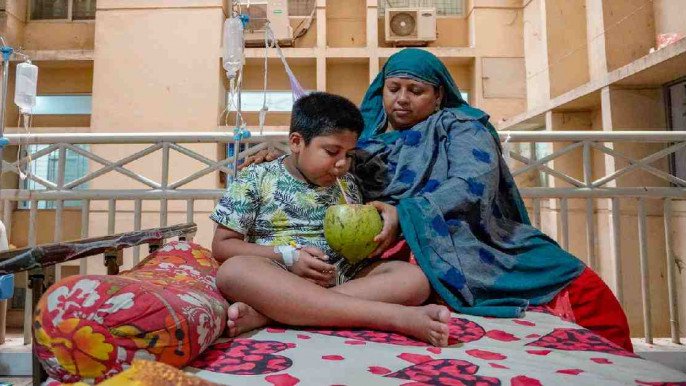
Dengue affecting children more severely, hospitals overburdened

Three and a half years old Muntaha has been admitted to Dhaka Shishu (Children) Hospital for the past 11 days.
She first had a fever earlier this month and a doctor from a local clinic in Jhenaidah prescribed her some medicine. But as her fever persisted, her doctor advised her to take a dengue test.
The test result came out positive and Muntaha was brought to Dhaka to get admitted to Dhaka Shishu Hospital.
"Muntaha's platelet count dropped to 9,000 yesterday, so doctors had to do a platelet transfusion. She was also diagnosed with pneumonia in the local clinic in Jhenaidah. Right now, her pneumonia symptoms have subsided but I am quite frightened about his platelet count," said Muntaha's father Arifuzzaman.
Sixteen-month-old Azan Ahmed is in the bed right next to Muntaha. Azan's mother admitted him to the hospital three days ago. Even though his fever came down and the platelet count increased from before, Azan is having trouble eating which led the doctors to suspect that he might have kidney problems.
"Initially, Azan's fever did not go below 104 Fahrenheit. Right now, his fever is under control but doctors said he is still at risk as he cannot eat. We have him on saline support for now," said Azan's mother Ayesha.
Muntaha and Azan are not alone in their fight against dengue. An increasing number of children are being admitted to the city's hospitals recently with symptoms of dengue. With the rising number of dengue patients, hospitals are also struggling with space.
For example, Dhaka Shishu Hospital has only 16 beds for dengue patients but as of Friday, some 59 children were admitted to the hospital with dengue-like symptoms. Many of these children come to the hospital in very critical conditions.
"This year, the children who are being admitted to the hospital are in much more critical conditions than other years. Platelet count declines faster, causing the children to go into shock. We are also having a significantly short period to assess the children who are being admitted," said Afroza Islam, emergency medical officer, Dhaka Shishu Hospital.
As of Friday morning, the hospital has had a total number of 618 dengue patients admitted to the hospital of whom 10 died and 550 patients returned home after treatment.
Dhaka's two other hospitals - Sir Salimullah Medical College and Mitford Hospital - combinedly have 158 dengue patients admitted as of Friday morning - the highest number of admitted dengue patients among the city's hospitals.
According to an estimate from the Control Room of Directorate General of Health Services (DGHS), in the past 24 hours as of 8 am on Friday, some 163 new dengue patients were admitted to hospitals around the country. And so far in September, some 4872 people have been admitted to hospitals.
Currently, some 1191 patients are undergoing treatment for dengue in the capital, as per the information received from 41 hospitals in Dhaka.
Outside of the capital, some 203 dengue patients are undergoing treatment.
A total of 57 people died so far from the mosquito-borne disease this year, a large number of whom were children. In September alone, at least 11 people have died.
So far this year, at least 15,228 people have been infected with dengue and some 13,980 returned home after treatment, as per the DGHS estimate.
President of Centre for Governance Studies Dr Manjur Chowdhury said, "There is a chance that the actual number of dengue patients is much higher than the government estimate. Most of the patients are taking treatment at home."
Dr Manjur also blamed the failure of the two city corporations in controlling aedes population in Dhaka for the increased infections this year.
Editor & Publisher: S. M. Mesbah Uddin
Published by the Editor from House-45,
Road-3, Section-12, Pallabi, Mirpur
Dhaka-1216, Bangladesh
Call: +01713180024 & 0167 538 3357
News & Commercial Office :
Phone: 096 9612 7234 & 096 1175 5298
e-mail: financialpostbd@gmail.com
HAC & Marketing (Advertisement)
Call: 01616 521 297
e-mail: tdfpad@gmail.com